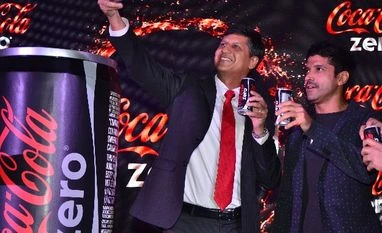In an email interview, he tells Indulekha Aravind about his plans to raise awareness about gender equality and discusses the recent kerfuffle over the term "feminist", wondering why anybody, male or female, would have a problem with wanting a level playing field for women.
Could you describe the importance of having a HeForShe campaign? What made you want to be part of it?
The HeforShe campaign focuses on the importance of men becoming active partners in making the world an equal place for all genders to live in. It has the same objective as the MARD initiative and being initiated by the UN, it is sure to amplify the message or call to action.
What do you plan to do raise awareness about gender equality in your role as a UN ambassador?
MARD is currently involved in a campaign called 'Helping Women Get Online' which aims to bridge the gap of male and female Internet users in India. We believe it to be a tool that can educate and empower them. We have also been engaging with student communities across India to emphasise the importance of a new mindset their generation has an opportunity to bring into the popular consciousness of our society.
November 19th was International Men's Day -- do you feel that men also need a day, and why?
I'm not too convinced by the need for these days but now since there is one, we should use it as a day to reflect and analyse how much progress we've made in the direction of an equal world, over the previous year.
Are such days of relevance, or have they become a tokenism, hijacked by brands?
In struggles like these, each day is relevant.
There seems to be a growing backlash over the term "feminism" and "feminist" these days --what is your take on the situation? Is it a case of the term being misunderstood?
I do feel that some people tend to get caught up over-analysing these terms. There's history to why there needed to be a distinct identity for a movement by women. In today's world, it's the ideology behind these terms that truly matter. Any person, man or woman wanting equal rights and a level playing field for women is a feminist. How can anyone have a problem with that?
You’ve reached your limit of {{free_limit}} free articles this month.
Subscribe now for unlimited access.
Already subscribed? Log in
Subscribe to read the full story →

Smart Quarterly
₹900
3 Months
₹300/Month
Smart Essential
₹2,700
1 Year
₹225/Month
Super Saver
₹3,900
2 Years
₹162/Month
Renews automatically, cancel anytime
Here’s what’s included in our digital subscription plans
Exclusive premium stories online
Over 30 premium stories daily, handpicked by our editors


Complimentary Access to The New York Times
News, Games, Cooking, Audio, Wirecutter & The Athletic
Business Standard Epaper
Digital replica of our daily newspaper — with options to read, save, and share


Curated Newsletters
Insights on markets, finance, politics, tech, and more delivered to your inbox
Market Analysis & Investment Insights
In-depth market analysis & insights with access to The Smart Investor


Archives
Repository of articles and publications dating back to 1997
Ad-free Reading
Uninterrupted reading experience with no advertisements


Seamless Access Across All Devices
Access Business Standard across devices — mobile, tablet, or PC, via web or app
)

